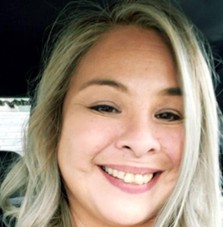
Kichi Makwa Ikwe, Kimberly James

- Home Community:
Bigwan Shkoo Ziibi (Roseau River). Acknowledged the following communities to honour my relatives in Tootinaowaziibeeng (Valley River), Ishkwaawinaaning (Skownan). - Cultural Identity:
Anishinaabe - Current Position:
Grade 3/4 Teacher, Ojibwe Language Program Riverbend Gikinoo'amaagewigamig. - Education/Training:
B.A., B.Ed. (CATEP), PBDE. University of Winnipeg M.Ed. at University of Saskatchewan. - Roles/Responsibilities:
As a teacher in the Grade 3 and 4 Ojibwe Language Program, my role is to nurture a safe, respectful classroom where students feel proud of who they are and excited to learn Ojibwe. I focus on building strong relationships, creating a sense of community, and supporting each student’s language journey through cultural teachings, storytelling, and meaningful, hands-on learning experiences.
“I see you. I know the road may feel long, especially when you’re carrying not just your own dreams but also the healing of generations. But you belong here. Your story, your voice, your strength, they matter.”
What obstacles did you face and how did you overcome them?
My journey into education is deeply rooted in healing, hope, and the desire to create a better future for the next generation. As an Anishinaabe woman, I carry the intergenerational impacts of the residential school system. These impacts showed up in the form of dysfunction within my family, and I often felt the weight of trauma that was never ours to carry—but was passed down all the same.Despite these challenges, I always knew I would attend university, even if I didn’t yet know how I would get there. That path became clearer when I was accepted into the first cohort of the Community-based Aboriginal Teacher Education Program (CATEP) through Seven Oaks School Division, in partnership with the University of Winnipeg. It was through this program—and the strong circle of support that came with it—that I found my way forward. Overcoming these obstacles required more than academic perseverance—it required healing. I had to believe that my voice mattered, that reclaiming space in education as an Anishinaabe woman was not only possible, but necessary.
What or who inspired you to really go after the profession you are in now?
Several people inspired me to pursue education. My best friend, Bernadette Smith, pushed me to believe in myself and reminded me of the importance of Indigenous voices in education. My husband, Kevin, has always been my rock—steady and supportive, even when the journey was tough. My grandmother, Theresa Eagle, who attended residential school, often told us how important education was. She carried her pain with strength and grace, and her words stayed with me. I honour my parents, Stanley and Gertrude James, and my siblings—Stan Jr., Glenda, and Glennie—who have always been a part of my journey. Their encouragement, resilience, and love helped me see that pursuing education wasn’t just about me—it was about all of us. It was a way to break cycles, to honour our past, and to imagine something better for our families and communities.
What critical choices or decisions did you make that helped you get where you are today?
The most critical decision I made was to become a teacher—not only for myself, but for my children: Kevin Jr., Kelly, and Kyle. I wanted them to have a better experience in education than I did. I wanted them to walk into classrooms where they felt seen, valued, and proud of who they are and where they come from. I wanted them to know that being Anishinaabe is a strength—not something to hide or overcome. That choice led me to create a classroom space where love, language, and culture are at the center. Now, I continue this work for my granddaughter Rylee, so she grows up surrounded by her culture, her language, and the knowledge that she belongs. Another important realization was learning to believe that what I do matters. For a long time, I didn’t think I was doing enough. But I’ve come to understand that showing up every day with love, language, and intention is enough. Reclaiming the Anishinaabe language in my classroom, in my family, and in myself is one of the most powerful choices I’ve made—and it continues to shape my purpose every day.
Message of Encouragement:
To Indigenous educators and future teachers: I see you. I know the road may feel long, especially when you’re carrying not just your own dreams but also the healing of generations. But you belong here. Your story, your voice, your strength, they matter. Education systems weren’t made for us, but we are reshaping them by showing up. Keep going! You are the medicine our communities need. Be the voice our Ancestors prayed for.


